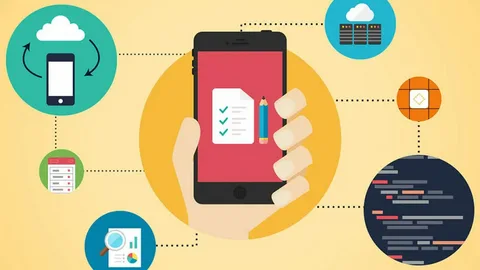Tech
Appium Best Practices for Hybrid App Testing

Hybrid apps combine elements of both native and web applications, representing a flexible and convenient option for developers in the realm of automation testing. Generally built using web technologies such as HTML, CSS, and JavaScript, hybrid apps function well on both Android and iOS devices seamlessly. Their unique specialty is fusing platform adaptability while leveraging native device functions. For developers, providing a seamless experience across multiple platforms, hybrid apps hold appeal to their dual nature. These apps can seamlessly run across Android, iOS, Windows, and web-based browsers – thanks to a single codebase that can be deployed across different operating systems.
Although native apps are more feature rich, Hybrid apps too can access certain native device features such as cameras, GPS, contacts, etc., by making use of plugins or APIs. A few popular hybrid app development frameworks include React Native, Flutter, Ionic, etc.
When testing hybrid apps, developers undertake a variety of testing procedures, these include – functional testing, UI testing, testing for compatibility, security, and much more. Developers often prefer testing hybrid apps through Appium.
Appium: The Powerhouse of Hybrid App Testing
Appium is a platform-independent framework for automating mobile app testing processes. It is an open-source automation tool and plays a significant role in testing hybrid applications. Appium offers robust platform support in effectively testing both native and web-based apps. For those new to Appium, its broad capabilities may appear daunting, but it comes equipped with its versatility.
“Write once, run anywhere” is central to Appium’s core philosophy. This fundamental principle drives the company’s approach to software development, providing a uniform API that spans platform barriers.
Appium distinguishes itself by supporting a wide range of programming languages such as Java, Python, Ruby, and more. Test automation engineers may use their preferred programming languages, which helps them make a smoother transition to Appium.
Appium maintains interoperability with test frameworks such as TestNG and JUnit. Testers may expedite their testing processes and enhance output by using the capability of these frameworks.
Appium Best Practices Using LambdaTest:
AI based test orchestration and execution platform, LambdaTest, revolutionizing the hybrid app testing landscape altogether. It is more than simply a platform; it offers an ecosystem of testing services, including mobile app testing. With over 3000+ test environments, including real device cloud available on demand, LambdaTest stands apart as one of the most efficient testing platforms. This comprehensive library of tools makes exhaustive testing across diverse devices and configurations possible. Added to it, Appium integration enables efficient automation of hybrid apps in addition to all other features.
The main feature of LambdaTest is its real-device testing infrastructure, which even outperforms emulators and simulators. The use of actual devices in testing ensures that findings are accurate, ensuring that your program operates effectively on legitimate devices.
Cloud-based platforms such as LambdaTest offer a remarkable selection of devices. With LambdaTest, you can test your hybrid app across various platforms like the latest smartphones, older devices, different screen sizes, and multiple OS versions. With this level of device diversity, your app will be compatible with any device that users use.
LambdaTest also offers parallel test execution. This means you may perform several tests on different devices at the same time whilst substantially reducing the overall time for the complete testing process. This skill is extremely valuable in the world of app development, especially in the fast-paced atmosphere of quick testing.
Best Practices for Hybrid App Testing:
Through rigorous testing, a set of guidelines helps to evaluate hybrid apps effectively. Let us delve deeper into these best practices, each serving as a pillar for robust testing:
- Precise Locator Selection: The selection of locators in test scripts requires accuracy. To reduce the likelihood of false positives and negatives during testing, hybrid app locators must be carefully selected.
- Diverse Device and Configuration Testing: Hybrid apps must undergo various tests across various device configurations, screen sizes, OS versions, and network bandwidth. With this diverse testing approach, the app works perfectly across multiple devices.
- Leveraging Cloud Testing: Using a cloud-based testing platform such as LambdaTest can be a game changer. Among the several cloud-based alternatives offered, LambdaTest stands out as an AI-powered test orchestration and execution option for conducting evaluations with amazing success and effectiveness.
- Automation for Efficiency: Through automation, the testing method gains increased efficiency, resulting in time savings and reliable outcomes. Automation technologies, such as Appium, make hybrid app testing easier, making it the most efficient technique that not only saves time but also guarantees tests are continuously run as intended.
- Page Object Model (POM): The Page Object Model (POM) design pattern provides a well-structured approach to structuring test scripts, which contributes to organizational excellence. This method improves script readability and maintainability, especially as complexity increases. It also assists in the effective management of test scripts as they get more complex.
- Harnessing Test Management Tools: Streamlining the process of organizing and monitoring test cases is what a robust test management tool does. With complex hybrid app testing projects, this is very helpful. Test management tools create comprehensive test reports, which help identify and fix app problems.
Step-by-step guidance on implementing Appium best practices on LambdaTest:
Putting Appium best practices into action on the LambdaTest platform is straightforward when following this step-by-step guide:
- Create a LambdaTest Account and Sign In: The LambdaTest journey starts from account creation. After creation, sign in to test the platform’s capabilities.
- Go to the Devices page: Within the LambdaTest interface, find and access the “Devices” section. Paying close attention allows you to choose the perfect devices and software for app testing.
- Initiate Testing: Testing can be initiated by clicking the “Run” button once all necessary configurations are in place. This action leads to the efficient execution of tests on designated devices by LambdaTest, resulting in comprehensive test reports.
With LambdaTest, your test will run on the chosen devices and generate a thorough report.
Enhancing Appium Best Practices using LambdaTest
To further enrich your approach to Appium best practices on LambdaTest, consider these supplementary tips:
Meticulous testing plans: Using test plans, comprehensive documentation of test cases and scenarios guarantees complete testing. It is crucial to map out the testing process by creating a detailed roadmap, including goals, test cases, expected results, and configurations.
Consistent Naming Conventions: Use consistent naming practices for test cases and scripts. This supports organizational efforts while streamlining test management and maintenance. A uniform naming convention helps identify the purpose, module, and version of each test case or script.
Enhance Clarity with Comments: Steps are explained through comments within test scripts. By taking this proactive stance, comprehension of tests is greatly superior, and the debugging method becomes easier if any test failure occurs.
Leverage Debugging Tools: Testing tools that assist in becoming aware of problems is an invaluable asset and debugging tools fall beneath this category. Line by line testing permits for correct problem identity and determining the way to test scripts. Familiarise yourself with your chosen automation framework’s debugging capabilities and any features LambdaTest provides.
Diverse Testing Environments: Inclusivity ensures seamless functionality by testing across various devices and configurations. This thorough testing technique provides no opportunity for unexpected glitches. By testing across a wide range of devices, LambdaTest offers broad compatibility and robust performance.
Harness Test Management Tools: Test management tools empower you with efficient test case tracking. With this functionality, the swift identity and fixing of app troubles improve the caliber of the end-result. If relevant, integration with test management tools allows for smoother test case management and reporting using LambdaTest.
Automate your tests: Automation may improve the efficiency of hybrid app testing, saving time and effort. To assist with hybrid app testing, numerous automation frameworks are available, including Appium. Automation and testing your apps may give repeatable test execution without the need for a guide.
Benefits of LambdaTest for Hybrid Apps Testing
Beyond its compatibility with Appium, LambdaTest gives several extra features that elevate testing efforts:
Flexible Pricing Plans: Through various pricing plans, LambdaTest guarantees accessibility for companies of all sizes. To find the plan that fits your agency’s requirements and price range, explore LambdaTest’s pricing alternatives.
Round-the-Clock Support: A dedicated support team is available 24/7 to offer assistance and guidance during your testing, offering well-timed assistance for any inquiries that you may come upon.
Extensive Documentation: LambdaTest differentiates itself with its extensive documentation, which serves as a helpful and trustworthy guide throughout your Appium testing journey on the platform. This resource is not only useful but also trustworthy, guiding users through the complexities of LambdaTest’s testing capabilities. Robust documentation is essential for improving your competence with LambdaTest and refining your testing tactics, resulting in a more effective and productive testing experience.
Real-Time Collaboration: The ability to share test sessions in real-time is a collaborative tool that substantially improves cooperation and the speedy discovery of faults. The collaboration capabilities provided by LambdaTest enable seamless communication and cooperation, making it simpler for teams to collaborate and handle challenges swiftly.
Conclusion:
As we’ve explored, hybrid apps offer developers a compelling blend of native and web technologies, promising a seamless user experience across both Android and iOS devices. Their unique ability to harness platform adaptability while leveraging native device functions makes them an enticing choice for developers seeking efficiency and reach.
Yet, the journey of hybrid app development has its own set of challenges. Ensuring these adaptable applications’ reliability and peak performance demands meticulous testing and scrutiny. We have delved into the complexities of this process, from the exhaustive analysis of different device settings to the demands of efficient tool usage and testing planning. The path may be stressful, but the rewards of delivering a top-tier hybrid app experience are worth the effort.


















































